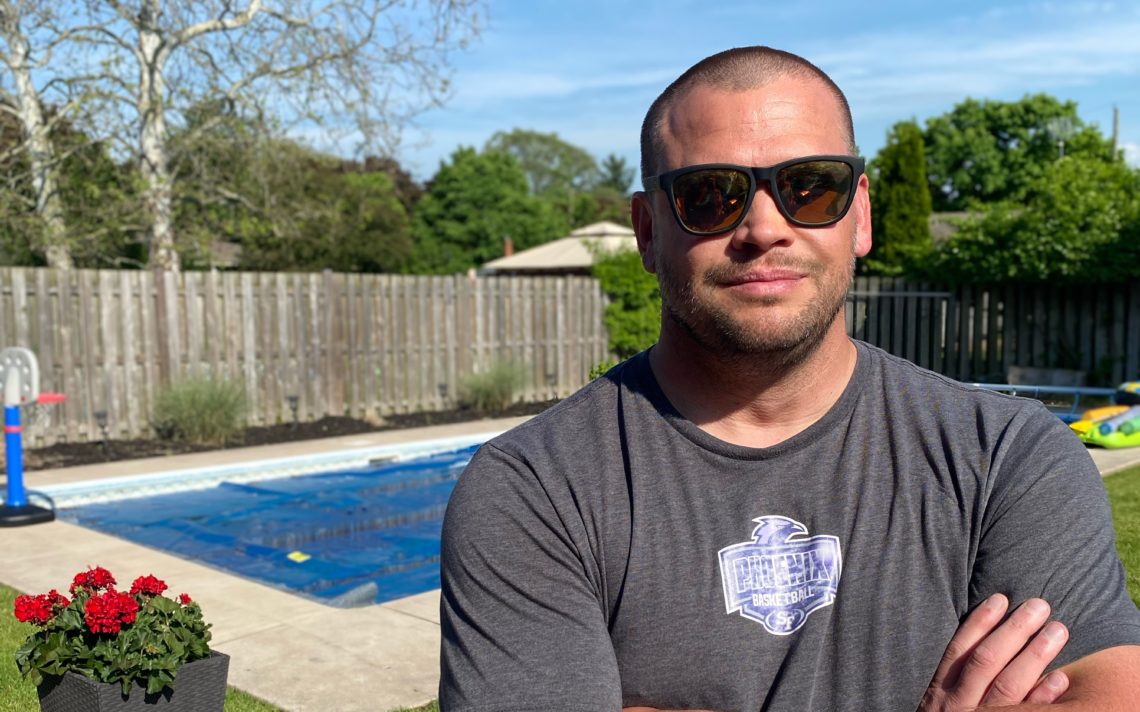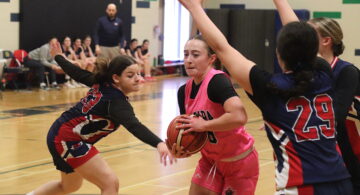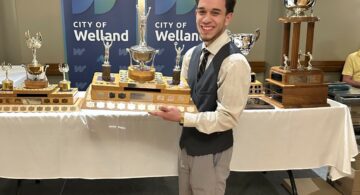
COVID-19 Closeup: Jon Marcheterre
COVID-19 Closeup
Subject: Jon Marcheterre, St. Francis basketball and baseball coach
What would you be doing right now with coaching if the pandemic hadn’t hit? After returning from OFSAA (Ontario Federation of School Athletic Associations’ basketball), we normally give the guys a breather, but at this point in the year, myself and my assistant coaches, would be working with the players on skill development, and supervising the strength and conditioning program (developed and implemented by our strength coach Brant Creelman). We would ease off the Xs and Os.
What are you doing now to coach basketball? Given the restrictions in place, we have had to completely adjust our off-season program. Our strength coach has developed an at-home program for our guys, and we are still trying to help them with skill development but we now do it remotely via Google Meet. What the pandemic has done though is bring the coaching community closer. It has provided tons of opportunities to develop as a coach through online coaching clinics. So a lot of sitting in front of a computer and learning.
What is the biggest obstacle to coaching during the pandemic? Being able to work with players in person. There is only so much theory you can deliver to the players.
What do you miss the most about the pre-pandemic world of coaching? Being in the gym, working with the guys, sharing some laughs, developing the relationships. There is only so much you can do in a video meeting.
What do you miss the least about the pre-pandemic world of coaching? I’ll be honest. There really isn’t anything I don’t enjoy about coaching. I am fortunate to have a very supportive family, so between university baseball, school basketball, and club basketball, I coach 12 months a year and most days of the week. It really is my passion.
What is the biggest thing wrong with school sports? The biggest challenge coaching sports in school settings are the for-profit, elite programs. Very rarely do they deliver what they promise to the athlete and more often than not they create problems (entitlement, unwillingness to struggle to earn positions etc.) that we have to deal with and correct.
Is there an easy way to fix the problem? No. The problem is rooted in the model itself. These for-profit organizations aren’t for the athlete. You just wish that they didn’t turn youth sports into lucrative businesses. The well being of the kids, skill development, and love of the sport gets lost in these programs. I respect everyone’s right to make a buck, it is just sad to see it being done in this manner. Ultimately, I don’t think there is an easy way to fix the problem.
Is there a hard way to fix the problem? I don’t think there is a willingness to fix the problem the hard way. Too many people are benefitting from the system and parents are rightfully unwilling to go in a way that is perceived to limit the opportunities for their children. Whether it is a prep program or an elite academy, youth sports as we knew it is forever gone. It is sad.
What would be one suggestion to make school sport better? Less elite programs. The product has become watered down to a point that they are no longer elite. They are all making the same promises but can’t deliver, and in turn you see kids jumping from one to the next based on playing time they have been promised or feel they are entitled to. It has eroded a sense of hard work to earn a position or playing time. Granted if you are paying thousands of dollars, you expect your kid to play. But with less elite programs and stronger grassroots development within the traditional sports bodies, you would see something closer to the old system.
Has the pandemic changed how you will approach coaching in the future? Yes. Beyond some concepts that I have learned from the different baseball and basketball clinics, I can see how through the video meetings a lot of athletes lack some of the basic answers as to why we do something on the court or field. The meetings we have been having have allowed for a lot of dialogue and it has revealed that some things that I took for granted, need to be better delivered.
What is the first thing you are going to do when life returns to normal? Two things. 1) When my hair grows back, get a professional cut from my barber. 2) Take my wife out for dinner. She deserves it for putting up with me 24/7 for the last 100-plus days.
What daily activity do you miss the most? Besides coaching, I actually miss going to work in a regular classroom and teaching. I miss interacting with my friends and colleagues face to face.
What guilty pleasure do you miss the most? Going to Avondale Dairy Bar after dinner for a chocolate peanut butter deluxe sundae and sitting by the pool listening to Jerry Howarth call afternoon Jays games on the radio.
What is your favourite outfit to wear around the house if you are working from home? Gym shorts and a T-shirt. My at-home uniform hasn’t really changed.
What do you do to replace the time spent coaching? I realized I hadn’t done groceries in about eight months. My wife always did them during basketball season. So I started doing our groceries. Not having a practice to go to everyday has given me a lot of time to play Lego, build forts and go on walks with my daughter.
Are you most likely to be a hunk, chunk, drunk or sasquatch when the pandemic ends? Chunk, no question. I am already on my way.
What is the worst habits you have picked up during the pandemic? Snacking, staying up too late and sleeping in. I am looking forward to getting back to a regular routine that doesn’t allow for any of those.
What is the best habit you have picked up during the pandemic? Mowing my lawn a little more frequently. Really, just spending more time with my family.
What is something good about yourself you have discovered during the pandemic? That I have the fortitude to resist watching Tiger King.
What is something bad about yourself you have discovered during the pandemic? That I have very strong feelings about how organized our tool/pool equipment shed should be.
BPSN and the COVID-19 pandemic
Like all small businesses dealing with the COVID-19 pandemic, BPSN is not sure what the business landscape will look like when things return to normal. Our website is financed primarily through advertising revenues and partnership agreements with many local sports and educational organizations in Niagara. Our goal is to continue providing our readers with the extensive local sports coverage you have come to expect from our site. Since our inception, we have written more than 2,800 stories on our local athletes and teams. Many of our readers have given us one-time donations or send us monthly contributions to help offset our costs. We would be eternally grateful if others would consider doing the same by using the Support Us button located on the right-hand side of our home page below the mosaic.
Thank you for your continued support.
Bill and Bernie.


























